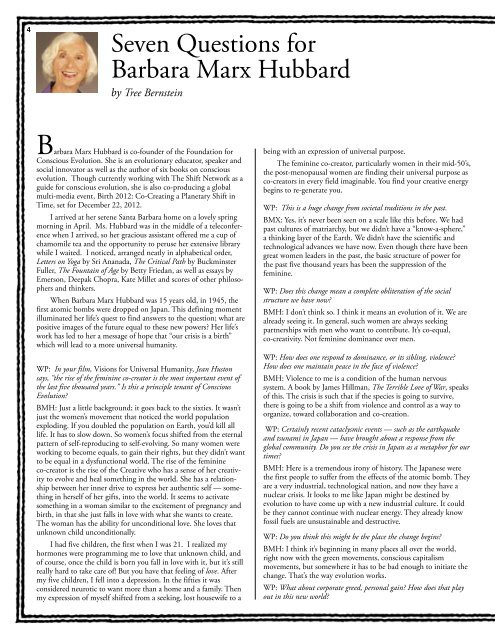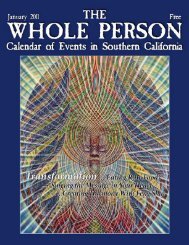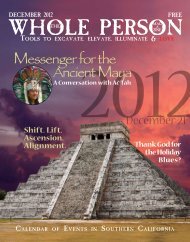* MAY 2011 FINAL.indd - Whole Person Calendar of Events
* MAY 2011 FINAL.indd - Whole Person Calendar of Events
* MAY 2011 FINAL.indd - Whole Person Calendar of Events
Create successful ePaper yourself
Turn your PDF publications into a flip-book with our unique Google optimized e-Paper software.
4<br />
Seven Questions for<br />
Barbara Marx Hubbard<br />
by Tree Bernstein<br />
Barbara Marx Hubbard is co-founder <strong>of</strong> the Foundation for<br />
Conscious Evolution. She is an evolutionary educator, speaker and<br />
social innovator as well as the author <strong>of</strong> six books on conscious<br />
evolution. Though currently working with The Shift Network as a<br />
guide for conscious evolution, she is also co-producing a global<br />
multi-media event, Birth 2012: Co-Creating a Planetary Shift in<br />
Time, set for December 22, 2012.<br />
I arrived at her serene Santa Barbara home on a lovely spring<br />
morning in April. Ms. Hubbard was in the middle <strong>of</strong> a teleconference<br />
when I arrived, so her gracious assistant <strong>of</strong>fered me a cup <strong>of</strong><br />
chamomile tea and the opportunity to peruse her extensive library<br />
while I waited. I noticed, arranged neatly in alphabetical order,<br />
Letters on Yoga by Sri Ananada, The Critical Path by Buckminster<br />
Fuller, The Fountain <strong>of</strong> Age by Betty Friedan, as well as essays by<br />
Emerson, Deepak Chopra, Kate Millet and scores <strong>of</strong> other philosophers<br />
and thinkers.<br />
When Barbara Marx Hubbard was 15 years old, in 1945, the<br />
first atomic bombs were dropped on Japan. This defining moment<br />
illuminated her life’s quest to find answers to the question; what are<br />
positive images <strong>of</strong> the future equal to these new powers Her life’s<br />
work has led to her a message <strong>of</strong> hope that “our crisis is a birth”<br />
which will lead to a more universal humanity.<br />
WP: In your film, Visions for Universal Humanity, Jean Huston<br />
says, “the rise <strong>of</strong> the feminine co-creator is the most important event <strong>of</strong><br />
the last five thousand years.” Is this a principle tenant <strong>of</strong> Conscious<br />
Evolution<br />
BMH: Just a little background; it goes back to the sixties. It wasn’t<br />
just the women’s movement that noticed the world population<br />
exploding. If you doubled the population on Earth, you’d kill all<br />
life. It has to slow down. So women’s focus shifted from the eternal<br />
pattern <strong>of</strong> self-reproducing to self-evolving. So many women were<br />
working to become equals, to gain their rights, but they didn’t want<br />
to be equal in a dysfunctional world. The rise <strong>of</strong> the feminine<br />
co-creator is the rise <strong>of</strong> the Creative who has a sense <strong>of</strong> her creativity<br />
to evolve and heal something in the world. She has a relationship<br />
between her inner drive to express her authentic self — something<br />
in herself <strong>of</strong> her gifts, into the world. It seems to activate<br />
something in a woman similar to the excitement <strong>of</strong> pregnancy and<br />
birth, in that she just falls in love with what she wants to create.<br />
The woman has the ability for unconditional love. She loves that<br />
unknown child unconditionally.<br />
I had five children, the first when I was 21. I realized my<br />
hormones were programming me to love that unknown child, and<br />
<strong>of</strong> course, once the child is born you fall in love with it, but it’s still<br />
really hard to take care <strong>of</strong>! But you have that feeling <strong>of</strong> love. After<br />
my five children, I fell into a depression. In the fifties it was<br />
considered neurotic to want more than a home and a family. Then<br />
my expression <strong>of</strong> myself shifted from a seeking, lost housewife to a<br />
being with an expression <strong>of</strong> universal purpose.<br />
The feminine co-creator, particularly women in their mid-50’s,<br />
the post-menopausal women are finding their universal purpose as<br />
co-creators in every field imaginable. You find your creative energy<br />
begins to re-generate you.<br />
WP: This is a huge change from societal traditions in the past.<br />
BMX: Yes, it’s never been seen on a scale like this before. We had<br />
past cultures <strong>of</strong> matriarchy, but we didn’t have a “know-a-sphere,”<br />
a thinking layer <strong>of</strong> the Earth. We didn’t have the scientific and<br />
technological advances we have now. Even though there have been<br />
great women leaders in the past, the basic structure <strong>of</strong> power for<br />
the past five thousand years has been the suppression <strong>of</strong> the<br />
feminine.<br />
WP: Does this change mean a complete obliteration <strong>of</strong> the social<br />
structure we have now<br />
BMH: I don’t think so. I think it means an evolution <strong>of</strong> it. We are<br />
already seeing it. In general, such women are always seeking<br />
partnerships with men who want to contribute. It’s co-equal,<br />
co-creativity. Not feminine dominance over men.<br />
WP: How does one respond to dominance, or its sibling, violence<br />
How does one maintain peace in the face <strong>of</strong> violence<br />
BMH: Violence to me is a condition <strong>of</strong> the human nervous<br />
system. A book by James Hillman, The Terrible Love <strong>of</strong> War, speaks<br />
<strong>of</strong> this. The crisis is such that if the species is going to survive,<br />
there is going to be a shift from violence and control as a way to<br />
organize, toward collaboration and co-creation.<br />
WP: Certainly recent cataclysmic events — such as the earthquake<br />
and tsunami in Japan — have brought about a response from the<br />
global community. Do you see the crisis in Japan as a metaphor for our<br />
times<br />
BMH: Here is a tremendous irony <strong>of</strong> history. The Japanese were<br />
the first people to suffer from the effects <strong>of</strong> the atomic bomb. They<br />
are a very industrial, technological nation, and now they have a<br />
nuclear crisis. It looks to me like Japan might be destined by<br />
evolution to have come up with a new industrial culture. It could<br />
be they cannot continue with nuclear energy. They already know<br />
fossil fuels are unsustainable and destructive.<br />
WP: Do you think this might be the place the change begins<br />
BMH: I think it’s beginning in many places all over the world,<br />
right now with the green movements, conscious capitalism<br />
movements, but somewhere it has to be bad enough to initiate the<br />
change. That’s the way evolution works.<br />
WP: What about corporate greed, personal gain How does that play<br />
out in this new world







